Related Research Articles

Theobald Wolfe Tone, posthumously known as Wolfe Tone, was a leading Irish revolutionary figure and one of the founding members in Belfast and Dublin of the United Irishmen, a republican society determined to end British rule, and achieve accountable government, in Ireland. Throughout his political career, Tone was involved in a number of military engagements against the British navy. He was active in drawing Irish Catholics and Protestants together in the United cause, and in soliciting French assistance for a general insurrection. In November 1798, on his second attempt to land in Ireland with French troops and supplies, he was captured by British naval forces. The United Irish risings of the summer had already been crushed. Tone died in advance of his scheduled execution, probably, as modern scholars generally believe, by his own hand.
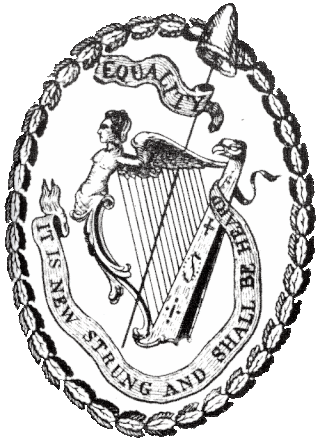
The Society of United Irishmen was a sworn association in the Kingdom of Ireland formed in the wake of the French Revolution to secure "an equal representation of all the people" in a national government. Despairing of constitutional reform, and in defiance both of British Crown forces and of Irish sectarian division, in 1798 the United Irishmen instigated a republican rebellion. Their suppression was a prelude to the abolition of the Irish Parliament in Dublin and to Ireland's incorporation in a United Kingdom with Great Britain. An attempt to revive the movement and renew the insurrection following the Acts of Union led to an abortive rising in Dublin in 1803.

The Irish Rebellion of 1798 was a major uprising against British rule in Ireland. The main organising force was the Society of United Irishmen, a republican revolutionary group influenced by the ideas of the American and French revolutions: originally formed by Presbyterian radicals angry at being shut out of power by the Anglican establishment, they were joined by many from the majority Catholic population.

Henry Joy McCracken was an Irish republican, a leading member of the Society of the United Irishmen and a commander of their forces in the field in the Rebellion of 1798. In pursuit of an independent and democratic Irish republic, he sought to ally the disaffected Presbyterians organised in the Society with the Catholic Defenders, and in 1798 to lead their combined forces in Antrim against the British Crown. Following the defeat and dispersal of the rebels under his command, McCracken was court-martialled and executed in Belfast.

Thomas Addis Emmet was an Irish and American lawyer and politician. In Ireland, in the 1790s, he was a senior member of the Society of United Irishmen as it planned for an insurrection against the British Crown and Protestant Ascendancy. In American exile, he took up legal practice in New York, earned a reputation as a staunch abolitionist, and in 1812 to 1813 served as the state's Attorney General.

William Drennan was an Irish physician and writer who moved the formation in Belfast and Dublin of the Society of United Irishmen. He was the author of the Society's original "test" which, in the cause of representative government, committed "Irishmen of every religious persuasion" to a "brotherhood of affection". Drennan had been active in the Irish Volunteer movement and achieved renown with addresses to the public as his "fellow slaves" and to the British Viceroy urging "full and final" Catholic emancipation. After the suppression of the 1798 Rebellion, he sought to advance democratic reform through his continued journalism and through education. With other United Irish veterans, Drennan founded the Belfast [later the Royal Belfast] Academical Institution. As a poet, he is remembered for his eve-of-rebellion When Erin First Rose (1795) with its reference to Ireland as the "Emerald Isle".
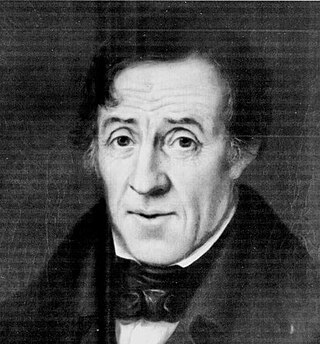
James "Jemmy" Hope was a radical democrat in Ireland who organised among tenant farmers, tradesmen and labourers for the Society of the United Irishmen. In the Rebellion of 1798 he fought alongside Henry Joy McCracken at the Battle of Antrim. In 1803 he attempted to renew the insurrection against the British Crown in an uprising coordinated by Robert Emmett and the new republican directorate in Dublin. Among United Irishmen, Hope was distinguished by his conviction that "the fundamental question at issue between the rulers and the people" was "the condition of the labouring class".
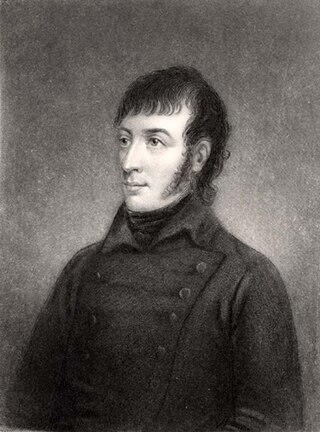
Thomas Paliser Russell was a founding member, and leading organiser, of the United Irishmen marked by his radical-democratic and millenarian convictions. A member of the movement's northern executive in Belfast, and a key figure in promoting a republican alliance with the agrarian Catholic Defenders, he was arrested in advance of the risings of 1798 and held until 1802. He was executed in 1803, following Robert Emmet's aborted rising in Dublin for which he had tried, but failed, to raise support among United and Defender veterans in the north.
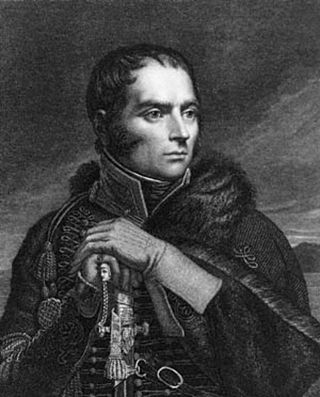
Arthur O'Connor, was a United Irishman who was active in seeking allies for the Irish cause in England and in France. A proponent of radical democratic reform, in Ireland he was distinguished by publishing political appeals to women. Arrested on the eve of the 1798 rebellion, in 1802 he went into exile in France where, after being raised to the rank of General in a force that was to invade Ireland, fell out of favour with Napoleon. Among the positions he maintained publicly in his final years were a defence of the July Revolution in Paris and opposition to what he saw as the clericalism of Daniel O'Connell's movement in Ireland.

Charles Hamilton Teeling (1778–1848) was an Irish political activist, journalist, writer, and publisher from Lisburn, County Antrim, Ulster. He was the second son of Luke Teeling a successful Catholic linen merchant who in the cause of complete Catholic Emancipation had been a delegate to the Convention, or "Back Lane Parliament", that had been called by the Catholic Committee in Dublin in December 1792. In 1798, the Teeling mill was to be destroyed by Orangemen.
Reverend William Sinclair was an Irish Presbyterian minister and, as a radical democrat, a member of the Society of United Irishmen. Forced after the rebellion of 1798 into American exile, he became a leading figure in the Irish immigrant community in Baltimore.
Thomas McCabe, a prominent merchant in Belfast, was an abolitionist credited with defeating a proposal to commission ships in the town for the Middle Passage, and, with his son William Putnam McCabe, was an active member of the Society of the United Irishmen.
George Cummins, also spelt George Cummings, was a Scotch-Irish American, active in Ireland in the revolutionary Society of United Irishmen and following his return to the United States after the Irish Rebellion of 1798, in the politics of the Democratic-Republican Party.
James Dickey was a young barrister from a Presbyterian family in Crumlin in the north of Ireland who was active in the Society of the United Irishmen and was hanged with Henry Joy McCracken for leading rebels at the Battle of Antrim.
William Tennant (1759–1832), often spelled William Tennent, was an Ulster Presbyterian banker and a leading member in Belfast of the Society of the United Irishmen who, in 1798, sought by insurrection to secure a representative and independent government for Ireland. After a period of imprisonment he returned to the commercial and civic of Belfast, in 1810 helping to found what is today the Royal Belfast Academical Institution.
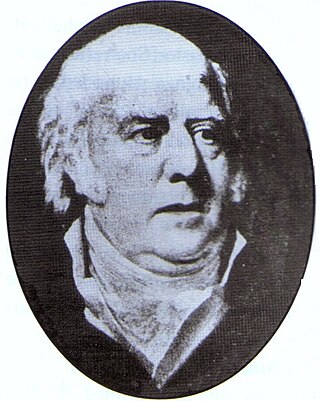
William Steel Dickson (1744–1824) was an Irish Presbyterian minister and member of the Society of the United Irishmen, committed to the cause of Catholic Emancipation, democratic reform, and national independence. He was arrested on the eve of the United Irish rising in his native County Down in June 1798, and not released until January 1802.
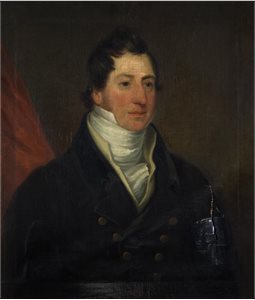
John Tennant (1777–1813) was an Ulster Presbyterian and a militant member of the Society of the United Irishmen and its northern executive. Facing the prospect of joining his brother William in prison, and hoping to join Wolfe Tone in expediting French assistance, he left Ireland in the summer of 1797. After the crushing of the risings in Ireland in 1798, he took service in the French army under Napoleon serving with distinction in the Irish Legion. He was killed in battle in Silesia in August 1813.
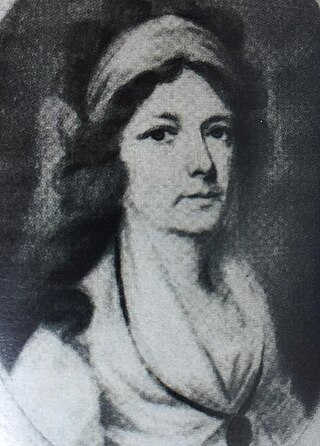
Martha "Matty" McTier was an advocate for women's health and education, and a supporter of democratic reform, whose correspondence with her brother William Drennan and other leading United Irishmen documents the political radicalism and tumult of late eighteenth-century Ireland.
William Putnam McCabe (1776–1821) was an emissary and organiser in Ireland for the insurrectionary Society of United Irishmen. Facing multiple indictments for treason as a result of his role in fomenting the 1798 rebellion, he effected a number of daring escapes but was ultimately forced by his government pursuers into exile in France. With the favour of Napoleon, he established a cotton factory at Rouen while remaining active as a member of a new United Irish Directory. He worked to assist Robert Emmett in coordinating a new rising in Ireland in 1803, and later had contact with the Spencean circle in London implicated in both the Spa Field riots and the Cato Street Conspiracy.

James MacDonnell was an Irish physician and polymath who was an active and liberal figure in the civic and political life of Belfast. He was a founding patron of institutions that have since developed as the Royal Victoria Hospital, the Royal Belfast Academical Institution and the Linen Hall Library and, beginning with the organisation of the Belfast Harpers Assembly in 1792, was a promoter of efforts to preserve and revive Irish music and the Irish language. Among some of his contemporaries his reputation suffered in 1803 as a result of his making a subscription for the arrest of his friend, the outlawed United Irishman Thomas Russell.
References
- Kibler, James Everett, Jr. 2009 Simms's Celtic Harp Studies in the Literary Imagination Georgia State University.
- The Rebellion in Ulster (http://www.ulsterancestry.com/newsletter-content.php?id=86)
- The Simms Initiative (http://simms.library.sc.edu/view_item.php?item=153735)
- Miller, Kerby, A. 2003 Irish Immigrants in the Land of Canaan: Letters and Memoirs from Colonial and Revolutionary America, 1675-1815: Letters and Memoirs from Colonial and Revolutionary America, 1675-1815, Oxford University Press.